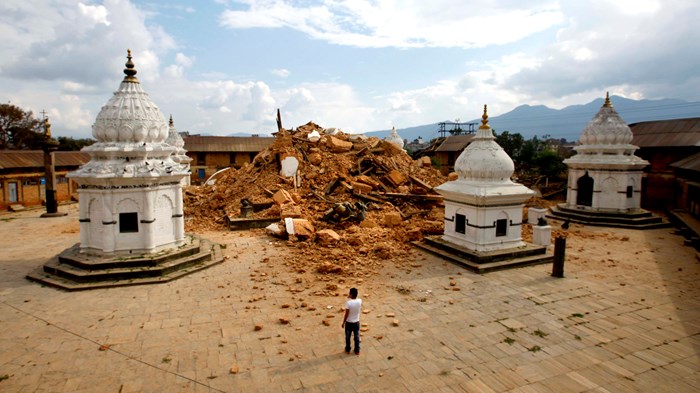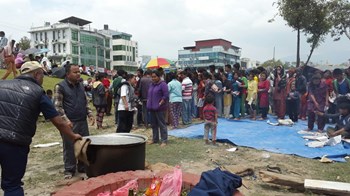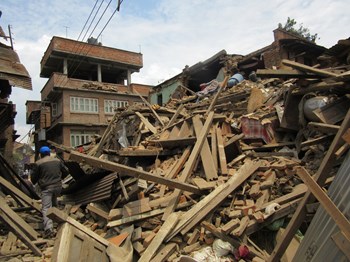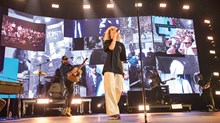
Editor's note: As aid organizations struggle to reach Nepal residents reeling from an earthquake 16 times more powerful than Haiti’s 2010 disaster, evangelical groups including World Vision, Convoy of Hope, and Samaritan’s Purse are racing to help survivors as aftershocks continue.
The 7.8-magnitude earthquake struck at 11:56 a.m. Saturday, when many Nepalese churches were still conducting their weekly worship services.

World Vision has 205 staff working on 73 projects in Nepal, including this relief assistance in Kathmandu.
“Many Christians were buried while they were worshiping on Sabbath and died,” the president of the Seventh-day Adventist Church in Nepal, Umesh Pokharel, toldAdventist Review.
AsiaNews reports that a Protestant church in the outskirts of the capital city, Kathmandu, collapsed and killed 70 worshipers. Global Mission Nepal identifies the church as Nepali Evangelical Church in Kapan, and put the death toll at 80.
A Brethren in Christ Church worker in Nepal reports:
Saturday is the worship day in Nepal and most churches have worship time between 10.00 AM to 12.30 PM. Terrifying earthquake came just in the last part of the worship hour at 11:56 Nepali time and most believers ran out from the church to save their lives, some got injured badly while running out, some trapped under building whereas other were buried alive in the church building as it collapsed. Although unclear some have reported 100 believers of a church in Kathmandu were worshipping on the 7th floor rented building was completely collapsed, some 40 dead bodies were taken out whereas other still missing. It was a great lose and misery day in the history of Nepal.
Gospel for Asia told Mission Network News that it expects similar stories to emerge. Assemblies of God World Missions reports that "three AG churches ... are totally destroyed and several lives lost."
Overall, approximately 500 Christians are feared dead, according to AsiaNews and a network of Nepalese churches.

Destruction in Bhakaptur.
The International Mission Board (IMB) reports that 17 bodies were found at a rural church which was hit during its closing prayer. “We appreciate your prayers for this church,” discipleship trainer Ramila Karmacharya told the IMB via Facebook. “Pray for the pastor, his family and the whole church family. The pastor lost three of his own family members.”
The Nepal Church of Christ in Kathmandu was holding services when the earthquake hit, leaving five families homeless and injuring one member. “Mobile phones are still not active and public transportation is not available,” the church posted on Facebook, requesting that anyone with a bicycle check on other church members.
Another church in Kathmandu was just letting out as the quake hit. “Ten minutes earlier and everyone would still have been inside,” said Christian Aid Mission’s South Asia director. “There would have certainly been many injuries, if not deaths.”
The impoverished, tourism-dependent nation also lost four of its seven UNESCO sites in the Kathmandu Valley. On Mt. Everest, at least 18 climbers died following an avalanche.
With more than 4,000 people dead from Nepal's worst earthquake since 1934, the tragedy will likely revive an ongoing debate over burial rituals. Nepal's minority Christians and Muslims favor burying their dead, while its majority Hindus prefer cremation. Plans to establish official cemeteries for Christians, who have tripled in number since the Hindu monarchy was abolished in 2006, have not resolved tensions [see below].
World Watch Monitor offers an in-depth report on the issues facing Nepalese Christians, including how a new constitution enshrining religious freedoms continues to be delayed.
-----
(WWM) As Nepal struggles to respond to the massive earthquake and aftershocks during the weekend that left thousands dead, the world has offered aid to a country which is still one of the poorest and most isolated in Asia, despite its attractive image for mountaineers and Western backpackers. It’s still overcoming the legacy of its 10-year Maoist insurgency and the final abolition of its monarchy in 2008.
The Hindu-majority country is yet to establish its new Constitution, a key part of the deal with the Maoists at the end of its civil war.
There’s "a lot more still to be done" before Nepal’s political parties arrive at a consensus on that Constitution, a leader of one of the ruling parties said last week. KP Sharma Oli of the United Marxist Leninist party said it’s unlikely to be ready by the latest proposed date of 29 May, and that the country might even have to wait another year. It follows an earlier remark by Prime Minister Sushil Koirala who said the constitution was just "a mouse click away".
These further delays will be a disappointment to the country’s Christians and other minority religions hopeful that the new constitution will guarantee them equal rights and religious freedoms. The country had been expecting the new constitution to be ready before its year end on 13 April.
As Vishal Arora reports in the video above, more than six years after the abolition of its Hindu monarchy, Nepal is yet to complete its transition to a secular democracy by declaring its new Constitution. Its Constituent Assembly has missed several deadlines for the announcement, two in the last two months.
The country’s first democratic election was held in 2008, after a bloody civil war led by Maoist guerrillas overthrew the monarchy. Now Nepal’s Christians—3% of the population—hope for equal rights and religious freedom to be guaranteed in the new Constitution. But now, as its political parties fail to agree what it will contain—latest deadline estimates are the end of May—Christians, who’ve suffered persecution and inequality for decades, are uncertain about their future.
Dr. K.B. Rokaya, a former member of Nepal’s National Human Rights Commission: "As far as the Christians are concerned, the top three agendas for us are, that we should have the constitution at the earliest, because the country cannot go on like this, you know, the transition period is too long. So that’s number one.
"Two, institutionalize the historic gains, like the republican setup and the secular state—these are two historic gains for which thousands of people. . .more than 17,000 people sacrificed their lives.
"And number three, that there will be full religious freedom because secularism does not always mean religious freedom, as we have seen in other parts of the world.
"We have defined full religious freedom. . .the inter-religious council in Nepal has also talked about this and other religious minority groups. . .what we have defined is that every citizen will have the freedom to choose the religion of his or her choice, number one. Number two is that people will be free to share their faith with fellow citizens. And then also, people should have the freedom not to believe in any religion."
VA: When Christians in Nepal talk about the right to practice their faith, they also refer to the right to have a legal identity for their churches and organizations, and the right to bury their dead.
Pastor Ram Prasad Shrestha, National Mission Commission of Nepal: "There’s no respect for Christianity, and of course we are not allowed to have open fellowship. The government allows us to have fellowship inside a hall or a building, but our churches are not registered. That’s a huge difficulty we have."
Pastor Sundar Thapa, Federation of National Christians – Nepal: "The church is not legally recognized by the government. That’s why the property of the church is in the name of three-four people. Sometimes, the church loses the property, so we are really worried about the future."
Dr. Mahendra Bhattarai, United Mission to Nepal: "There is no law as it is at the moment, in the present [interim] constitution, which can identify organizations as being Christian, Muslim or Hindu. And according to the NGO law, they are not allowed to engage in religious activities. So if Christian organizations are doing religious activities, they can be prosecuted.
"Because churches cannot be registered as churches. . .what’s happening now is that there is a group of people who have formed a committee, a church committee. They have bought land under their collective names. . .like three people, four people, pastor etc. . .Now sometimes when they don’t get along with each other, they start saying we’ll split the church, therefore we’ll split the land."
Sundar Thapa: "When a Christian dies, there’s no burial ground. So we really have to hurry when a person dies, and also secretly. . .immediately within the hour. . .we have to take [the body] into the jungle where nobody can see, or in the midnight. We’re also not given security to bury the dead body. Sometimes Hindus come and beat us up, and the same dead body we are taking out three times and burying three times."
Ram Prasad Shrestha: "I have an example. My brother-in-law passed away, and we had to drive the dead body for five hours because we did not get a burial plot here, a cemetery, in Kathmandu valley."
Dr. Mahendra Bhattarai: "You see, some churches have small pieces of land, where they can bury their people. But even they have a problem of just getting access to their land. The land belongs to them but the road is public. So when they take the dead body, the problem is that some people just come, get together and make disturbance so that they cannot reach the burial ground.
"Now, they [the authorities] are also talking about electric cremation [as used in the West]; [the idea’s] been around for a long time. But some Christians don’t feel that electric cremation fulfills their spiritual feelings."
VA: The inequality in Nepal reflects social and political attitudes. Nepal was a Hindu kingdom for centuries, and some Hindus now feel uneasy about losing the supremacy they enjoyed in the past. And the recent victory of the Hindu nationalist Bharatiya Janata Party in neighboring India has made Nepal’s rightwing Hindu groups even bolder in resisting the idea of secularism and in accusing Christians of unethical conversions.
Dr. Mahendra Bhattarai: "The relations between Hindus and Christians are at different levels, depends who they are and who you are. Some Hindus are staunch Hindus, and they do not want to know. . .or hear the word ‘Christian.’ And some so-called intellectuals repeat [Mahatma] Gandhi’s statement, saying, ‘I like Christ but not Christians’. And some are very, very helpful and positive and very supportive.
"A lot of politicians are anti-Christian now. And with the rise of the BJP in India, they think that the BJP is going to support them forever.
"At least one political party is trying to win the votes on anti-Christian feeling. Now that doesn’t do good to Nepal; that is divisive.
"Conversion is entirely personal, but then they say that we are converting them by giving them enticements, which we are not doing."
Ram Prasad Shrestha: "Even in society, when. . .people come to know that you’re a Christian or you say I’m a Christian, they immediately jump in and say, "Oh, you became Christian just because of some benefits, just because of the dollar or just because of some assurances, financial assurances. So they don’t see the reality, they don’t see the truth from the Bible why. . .how they have become Christian.
"Even in the Constituent Assembly, political parties, they get candidates from different groups, different minorities, from Muslims. . .even the gay community, they have representation from the gay community. And we are more than a three-percent community, and they ignore us."
K.B. Rokaya: "The way our Hindu friends are going ahead, and the language they are using, the hate speech they are using, and the violence they are exhibiting. . .like forming an army, forming sena [’army’ in Nepali language]...’We’ll attack churches, we’ll destroy churches, we’ll breaks the legs of Christians’. . .this kind of language will be counterproductive for Hinduism."
Pastor Tek Dahal, National Churches’ Fellowship of Nepal: "We have been treated in the past as second-class citizens. We do not have a long history of Christianity in Nepal. Since 1950, the late King Tribhuvan allowed Christians to live in the nation. Before, the Rana regime, they were not allowing Christians to live in the nation. 2006 is the year our nation was declared as a secular nation. Though we are here 1.1 million, the government has not accepted us [Christians] as one of the religions of the nation."
VA: Christians are hoping and praying for the best amid the delay in announcing a new constitution. But they say they are also prepared for the worst and to carry on, come what may.
Mahendra Bhattarai: "We have to love our brothers irrespective of their faith, irrespective of their level of spirituality. . .because God. . .and there’s only one God, there’s only one Creator. . .therefore they may be Hindus, they may be Muslims. . .whatever. . .they are still God’s creation. And they are our brothers."
K.B. Rokaya: "As Christians, we are always prepared to work and live our faith under any circumstances. So hindrances, difficulties, obstacles do not hinder Christians from living their Christian faith and also propagating and sharing their faith.
"Even though there are some voices, some groups of people who are not very happy with this [secularism] and who would like to see Nepal become a Hindu kingdom again, I think Nepal cannot go back."

Support Our Work
Subscribe to CT for less than $4.25/month




















